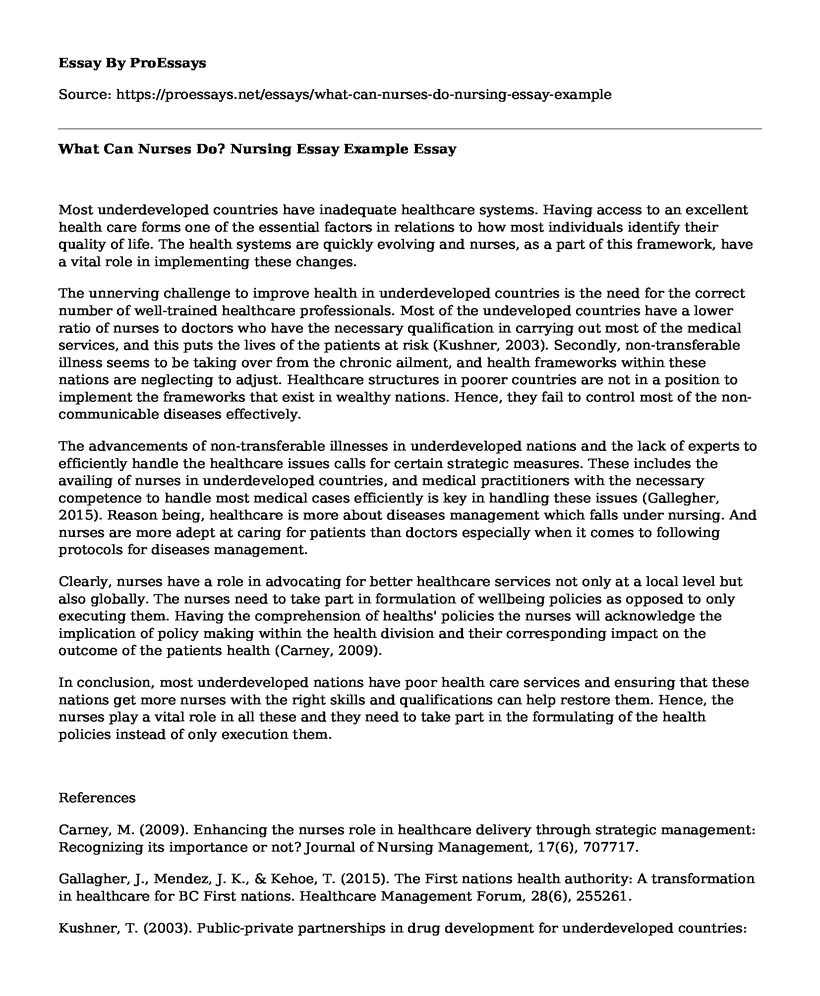Most underdeveloped countries have inadequate healthcare systems. Having access to an excellent health care forms one of the essential factors in relations to how most individuals identify their quality of life. The health systems are quickly evolving and nurses, as a part of this framework, have a vital role in implementing these changes.
The unnerving challenge to improve health in underdeveloped countries is the need for the correct number of well-trained healthcare professionals. Most of the undeveloped countries have a lower ratio of nurses to doctors who have the necessary qualification in carrying out most of the medical services, and this puts the lives of the patients at risk (Kushner, 2003). Secondly, non-transferable illness seems to be taking over from the chronic ailment, and health frameworks within these nations are neglecting to adjust. Healthcare structures in poorer countries are not in a position to implement the frameworks that exist in wealthy nations. Hence, they fail to control most of the non-communicable diseases effectively.
The advancements of non-transferable illnesses in underdeveloped nations and the lack of experts to efficiently handle the healthcare issues calls for certain strategic measures. These includes the availing of nurses in underdeveloped countries, and medical practitioners with the necessary competence to handle most medical cases efficiently is key in handling these issues (Gallegher, 2015). Reason being, healthcare is more about diseases management which falls under nursing. And nurses are more adept at caring for patients than doctors especially when it comes to following protocols for diseases management.
Clearly, nurses have a role in advocating for better healthcare services not only at a local level but also globally. The nurses need to take part in formulation of wellbeing policies as opposed to only executing them. Having the comprehension of healths' policies the nurses will acknowledge the implication of policy making within the health division and their corresponding impact on the outcome of the patients health (Carney, 2009).
In conclusion, most underdeveloped nations have poor health care services and ensuring that these nations get more nurses with the right skills and qualifications can help restore them. Hence, the nurses play a vital role in all these and they need to take part in the formulating of the health policies instead of only execution them.
References
Carney, M. (2009). Enhancing the nurses role in healthcare delivery through strategic management: Recognizing its importance or not? Journal of Nursing Management, 17(6), 707717.
Gallagher, J., Mendez, J. K., & Kehoe, T. (2015). The First nations health authority: A transformation in healthcare for BC First nations. Healthcare Management Forum, 28(6), 255261.
Kushner, T. (2003). Public-private partnerships in drug development for underdeveloped countries: An interview with Craig Wheeler, president of Chirons biopharmaceutical division. Cambridge Quarterly of Healthcare Ethics, 12(04).
Cite this page
What Can Nurses Do? Nursing Essay Example. (2021, Mar 30). Retrieved from https://proessays.net/essays/what-can-nurses-do-nursing-essay-example
If you are the original author of this essay and no longer wish to have it published on the ProEssays website, please click below to request its removal:
- Course Work of a Nursing Student: Barriers Implementing My Practicum Project
- Cancer Review Research Example
- Paper Example on Merck Company and River Blindness
- Pathophysiology Reflection and Artifact Approaches in Learning Essay
- HIV Virus Essay Example
- Campaign Plan/ Ballot Initiative
- Nurse Self-Growth: Achieving the Best Self for Quality Care - Essay Sample







